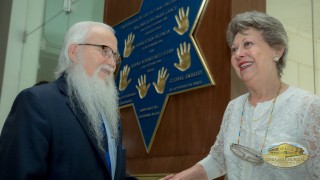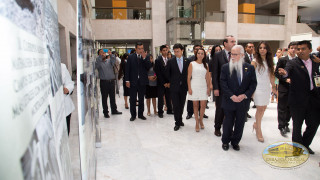In Mexico, the GEAP promotes the lessons of the Holocaust to foster a culture of peace
Fifth plaque of survivors in the nation
“Pople who do not know their history are condemned to repeat it.” (George Santayana)
According to this thought, the Global Embassy of Activists for Peace (GEAP), works to keep alive the memory of the Holocaust through the testimony of the survivors as a lesson in life, to avoid repetition and build peace; this time, with the presentation of the fifth "Traces to Remember" plate in Mexico.
On this plaque, in the shape of the Star of David, were imprinted the palm prints of Mrs. Paula Feldman Ganz, those of her daughter Rosa Stern Feldman and her granddaughter Lleana Schimelmitz Stern, as evidence that Nazism could not extinguish the Jewish people and as an emblem of perennial remembrance for present and future generations, which promotes the defense and respect of Human Rights.

"Traces to Remember" is one of the lines of action of the GEAP project "Educating to Remember", which in addition to honoring the memory of the victims, is a way of creating spaces for reflection and education on the facts and consequences of the Holocaust.
UNESCO recognizes that teaching the history of the Holocaust is essential to promote the observation of human rights, fundamental freedoms and the values of tolerance and mutual respect.
The unveiling of the plaque was carried out in the Museum of Mexican History of the city of Monterrey, Nuevo León, place selected as the first installation site, where it will remain for a month.
The ceremony was attended by Dr. William Soto Santiago, Executive President of the GEAP, Gabriela Lara, General Director of the GEAP, as well as government authorities, Arturo Alberto Fernández Cisneros, on behalf of the Governor-elect of the state of Nuevo León, Jaime Rodríguez Calderón, Catalina Rivera Díaz, First Visiter of the State Human Rights Commission.
Also participating were Mr. Radko Tichavsky Krcalova, Consul of the Czech Republic; Dr. Jacobo Wapinsky Kleiman, from the Israelite Community of Monterrey; and Luis Felipe Ibarra representing Magdalena Cárdenas García, General Director of three museums.
Among the special guests were Mrs. Elsa Fujimoto, Executive Director of the Comenius University Center and Sergio Armando Sisbeles Alvarado, Undersecretary of Prevention and Citizen Participation, representing the Constitutional Governor of the State of Coahuila de Zaragoza. Also attended by academic authorities, teachers, media, activists for peace, among others.

"You cannot prevent what you do not know"
Dr. William Soto, author of the project "Educating to Remember", mentioned in his participation the reasons that make the Holocaust one of the most serious attacks against humanity and indicated the necessary actions to prevent acts of this nature.
"The universality of the policies implemented, the machinery used to assassinate, the arbitrary laws implemented to achieve the purpose, and the helplessness and deception of the victims, make the Holocaust the paradigm of the genocidal act. The Jewish Holocaust is without a doubt an unprecedented genocide; and for its prevention it is necessary to know, study and socialize its characteristics; because you cannot prevent what you do not know”.
Why teach about the Holocaust?
Mrs. Gabriela Lara, in her speech explained the reasons why the GEAP bases on the teaching of the Holocaust as a paradigm of the genocidal act, with the purpose of promoting an education in values and the promotion of Human Rights.
“If we think about what Human Rights were violated, what were the Universal Values that were transgressed in the Holocaust, we realize that they are those that currently, in Mexico and in all the countries of Latin America, are producing the same acts of intolerance, insensitivity and discrimination. Therefore, it is important to educate by taking the Holocaust as that historical fact that allows us to show the importance of teaching values and Human Rights”.
A lesson for the world

Survivor Paula Feldman Ganz emotionally recounted some of her experiences in the Holocaust and highlighted the role of the State in her encounter with freedom.
"Everything that happened was very difficult, but fate brought us, on May 1, 1949, to a free country, Mexico, where we found the freedom we longed for. I implore the Almighty that the world has learned its lesson, and that the peoples and nations live in peace and harmony."
On behalf of the Israelite Community of Monterrey, Dr. Jacobo Wapinsky Kleiman said:
"The six million victims were individual beings each with a face and name, with children, parents and friends; a whole way of life died with them, their language and customs, songs, aromas, sounds, dreams and hopes. Those who perished in the Holocaust did not have the option of dying, we have the option of remembering and not forgetting (...) We must take the lessons of the Holocaust into account in order to foster a culture of peace”.
A decisive commitment to build peace
As a representative of the local government, Arturo Fernández Cisneros expressed his commitment to promote the remembrance of the Holocaust.

"We reiterate our commitment to you, so that this period of history is not forgotten and serves as an example to continue fighting for a better country, where social equality becomes a reality."
On her part, Catalina Rivera Díaz, emphasized the 1999 Declaration of the United Nations on a culture of peace, in relation to the institution of the bastions of peace.
"The Constitution of the United Nations Organization established precisely that 'wars are born in the minds of men and therefore it is in the minds of men that the pillars of peace must be erected'. She noted that they recognized that peace is not only the absence of conflicts but also requires a positive, dynamic and participatory process, in which dialogue is promoted and conflicts are resolved in a spirit of human understanding and cooperation."
The creation of these social links through the promotion of the lessons of the Holocaust, through the testimony of the survivors, as well as other initiatives that promote the teaching of this genocide, promote the recognition of Human Rights and respect for dignity human for the construction of peace.
In this sense, the GEAP carries out global projects and programs dedicated to strengthening international justice and educating about the Holocaust, among them "Educating to Remember" and "Justice for Peace", which have among their lines of work the promotion of a law at a Latin American level, to include the Holocaust as a subject of study, as a tool for the teaching of Human Rights and Universal Values both in primary and higher education, and in universities as a transverse chair.


